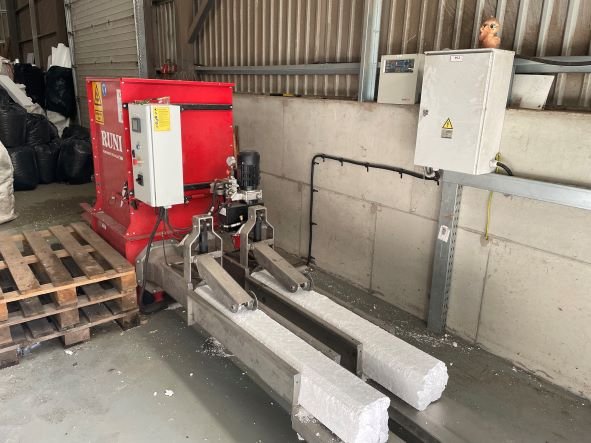
Two associated entities have submitted proposals to the Ministry of the Environment with a view to significantly expand the recycling of expanded polystyrene for Lithuania’s decarbonisation and circular economy objectives.
In autumn 2021, the environment and energy ministries initiated working groups on decarbonisation in several economic sectors. They are expected to play an important role in finding a consensus on how Lithuania can become climate neutral by 2050 and in achieving an open, effective dialogue in the updated National Energy and Climate Action Plan.
The Expanded Polystyrene Association participates in the Waste and Circular Economy Working Group. It has made suggestions on how to develop the recycling of expanded polystyrene (EPS) in Lithuania based on the experience of its members.
Expanded polystyrene is a very “green” material
As waste handlers, members of the Expanded Polystyrene Association (PPA) accept clean EPS offcuts and mechanically compress them for submission to EPS recyclers.
Expanded polystyrene is the “greenest” of the main insulation materials used in Lithuania, as it requires very little energy to produce and can easily be recycled and used to produce new EPS. Expanded polystyrene is 98% air and 2% polystyrene.
Expanded polystyrene is recycled in two stages. PPA members use compressors to compress the EPS cut-offs into blocks and sell them to recyclers in Lithuania or abroad. Their main partner is Circkleplast in Kaunas, Lithuania, which processes the compressed EPS into polystyrene pellets used to produce new EPS or XPS products. After the polystyrene is compressed, its volume is reduced by a factor of 40 to 90 depending on the equipment used.
According to a study commissioned by the Danish Environmental Protection Agency, recycling 1 kg of EPS saves 1.8 kg of CO2 compared to producing entirely new EPS.
Regional waste managers plan a breakthrough
The Waste and Circular Economy Working Group also includes the Lithuanian Association of Regional Waste Management Centres (RWC), which has put forward a number of proposals relevant to its field to receive partial public funding.
One of these proposals is the purchase and use of EPS compactors for all RWCs. For this measure, EUR 0.5 million is requested, with the expectation of 75% public funding. According to Algirdas Reipas, head of the association, this amount could be used to purchase around ten presses.
The Alytus Regional Waste Management Centre (ARWC) is the only one that separates polystyrene from the overall waste stream and prepares it for recycling. At the beginning of 2020, ARWC purchased a modern Danish EPS compactor through public procurement. In 2021, it compressed around 30 tonnes of polystyrene.
The polystyrene comes to ARWC from bulky waste collection sites in the Alytus region, where residents place their clean EPS in large EPS-only bags. Expanded polystyrene is currently mixed with other construction waste at bulky waste collection sites in the other nine regions.



Two organisations, one approach
The Expanded Polystyrene Association, unaware of the Lithuanian Association of Regional Waste Management Centres plans, made very similar proposals to the Waste and Circular Economy Working Group.
“Waste managers have a lot of challenges, as reflected in their proposals, but we are pleased that their attention was also drawn to how to improve the management of EPS in order to achieve a circular economy,” says PPA president Saulius Skrodenis.
In Western Europe and elsewhere in the world, there are already well-developed networks for the collection and recycling of expanded polystyrene, and these prefabs are supplied for the remanufacture of polystyrene. For example, in Denmark, EPS is already collected separately from other waste in 40 municipalities, representing 47% of the country’s population.
“Meanwhile, in Lithuania, expanded polystyrene is very rarely separated from the overall waste stream, losing valuable raw material. Therefore, we believe that the experience of the Alytus Centre is very valuable and should be applied throughout Lithuania. In addition, the experience of Danish municipalities, where expanded polystyrene can be sorted by residents already at their homes, should be studied and adopted in the future. This will be the case here too – better sooner than later,” Skrodenis says.
The European Manufacturers of Expanded Polystyrene (EUMEPS) is committed to the European EPS industry recycling 46% of EPS waste by 2025. PPA is a member of EUMEPS.
Invented 70 years ago, expanded polystyrene can be recycled many times without changing its properties. Due to its extremely good thermal insulation properties, strength and lightness, EPS has spread to a wide range of human activities.

Be the first to comment